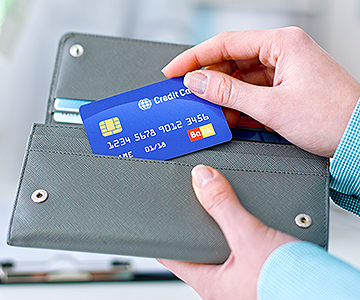Credit card or debit card: which one should you use? The answer: it depends. I know, not very helpful, so let me walk you through what factors go into deciding which is best.
When should you use a credit card?
In general, credit cards are the safest spending approach, as long as you are paying off your balance each month. If you forget to make a payment, you can get hit with fees and your credit score could take a nosedive. Credit cards tend to be safer because they don’t link directly to your checking account like your debit card does. That means if something happens, like your card information is stolen, the credit card company can help you recover your funds, without putting any holds or constraints on your checking account.
There are a few specific situations where you may benefit from using a credit card rather than a debit card:
- When you are on vacation – it’s best to use a credit card and have your debit card as backup. Learn more about credit and debit card safety for your upcoming vacation here.
- When you are online shopping – cyber scams happen frequently, so be sure to check for secured URLs and shop on credible websites. And, even if the website is secure, I still recommend using a credit card for the same reason as above: you don’t want to tie up your checking account if anything goes wrong.
A credit card is also a great option if you are hoping to earn rewards points or cash back on your purchases. This can help you make your money go further (again, just as long as you continue to make your monthly credit card payments on time).
When should you use a debit card?
Debit cards are a great tool to help you manage your budget. When you use a debit card, the funds come directly from your checking account, meaning it’s easier to see your spending money “drain” in real time, compared to adding up expenses on one bill you pay off at the end of the month. In short, a debit card helps you immediately track your spending habits. This is especially helpful if you use budgeting tools like a personal finance manager, which automatically categorizes your debit card purchases into your budget categories. Easily tracking your expenses can help you stick to the budget you built.
ATMs usually charge a fee for withdrawing cash from both your credit and debit card. The benefit of using a debit card is that those fees can sometimes be waived. For example, at Bankers Trust, we waive service fees for any customer using a Bankers Trust debit card at a Bankers Trust ATM. Learn more about ATM fees and how to avoid them here.
Always safeguard your card information
A major threat to both credit and debit cards are skimmers. Skimmers are covers that can be put over machines like ATMs or gas pumps and are virtually invisible to an unsuspecting customer. If you unknowingly put your card in a skimmer, this dangerous scam can easily steal all of your card information. Always check the machine to see if you notice anything “off” about it, like a misaligned sign or logo or it seems a bit unstable – this could be a sign of a skimmer.
Also, never share your card information with anyone. If you give that information out, you can no longer guarantee its safety. If you believe your card information has been stolen, check out our article on what to do after your card has been compromised.








 Equal Housing Lender. SBA Preferred Lender. NMLS #440379
Equal Housing Lender. SBA Preferred Lender. NMLS #440379